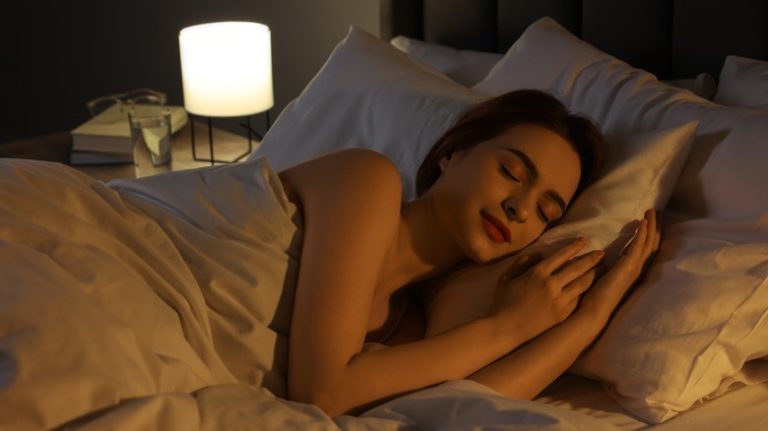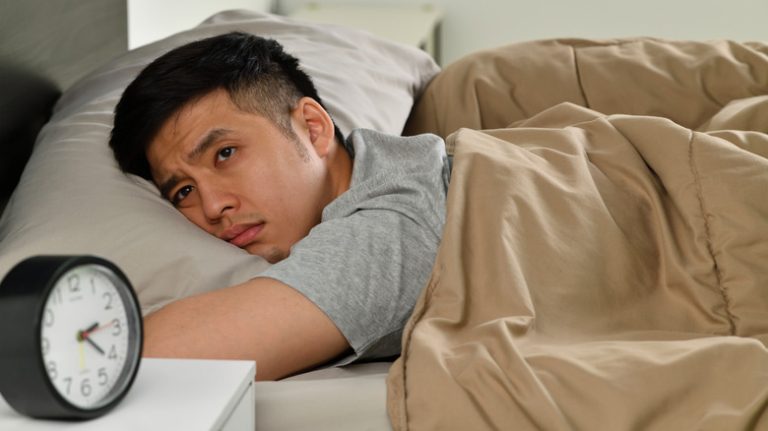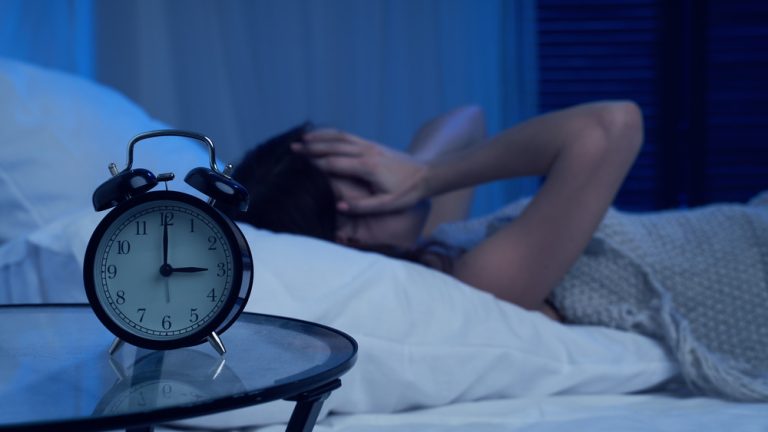Do you have problems with sleep? Maybe you have trouble falling asleep or staying asleep, or you fall into the trap of scrolling through your phone for hours before actually closing your eyes? Well, you’re not alone. According to the National Sleep Foundation, adults should be sleeping between 7 to 9 hours every night. Babies, small children, and teenagers generally require more sleep, though the recommended amount varies depending on their age. However, almost 70 million Americans struggle with persistent sleep issues, according to the Centers for Disease Control and Prevention (CDC). And a staggering 100 million Americans don’t get enough sleep every night (via Cleveland Clinic).
Sleep is pretty valuable and it can affect almost every part of your life: your mental and emotional health, productivity, relationships, and overall physical health. A lack of sleep can not only make you feel tired and grumpy, but can actually contribute to other long-term health issues like depression and obesity (via CDC). So how do we get better sleep at night? Let’s learn about some of the most common mistakes you could be making that are ruining your sleep.
Staring at a screen before bed
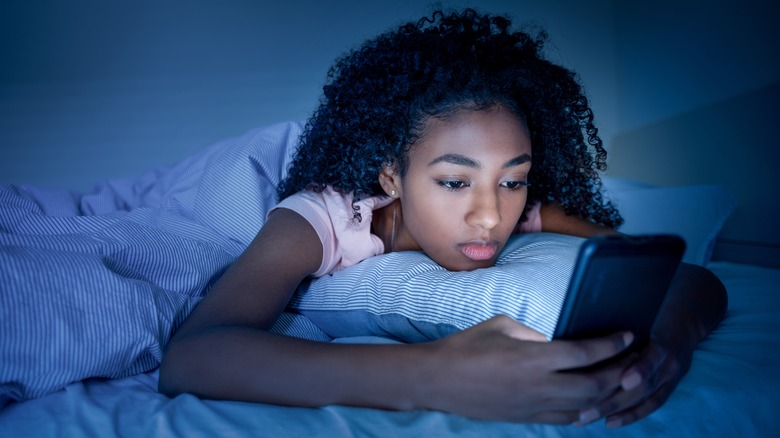
Maybe you’ve already heard this before, but let us reiterate: Screens are bad when it comes to sleep. Our bodies have a biological clock that is connected to our circadian rhythm, which is programmed to sleep at night and be awake during the day (via National Institute of General Medical Sciences) — and this programming is partly dependent on the body getting signals from its outside environment (via Healthline). Light and darkness are two of those signals. During the daytime, sunlight helps to perk up both our attention and mood. Later on, darkness causes our bodies to become sleepy.
Screens from devices like smart phones, laptops, and TV screens can interfere with this process because they emit a wavelength of light called blue light — which is also emitted by the sun. Blue light signals to your brain that it’s time to be awake and alert, so exposure to this light at night confuses your brain and can alter your circadian rhythm. This can cause your brain to think it’s still daytime, so it believes it does not need to release important sleep hormones like melatonin that tell your body that it’s bedtime (via Healthline). Therefore, if you have too much screen time late in the day, you might not feel tired at night and will have trouble sleeping when you try to get to bed.
Fortunately, many modern devices now have apps you can use that help block their blue light. You can also buy special glasses that help reduce your blue light exposure. But your best bet is to turn off all electronic devices at least two hours before you want to go to sleep at night.
Drinking caffeine later in the day
We’re not here to tell you coffee is bad –– it can actually have many benefits, like increasing energy and reducing the likelihood of depression (via Healthline). But it can also be highly energizing, and drinking it too late in the day can alter your sleep at night. In fact, one scientific study published in the Journal of Clinical Sleep Medicine found that drinking caffeine up to six hours before bed had a dramatic negative affect on sleep. Caffeine can stay in your system for up to eight hours (via Healthline), so depending on your bedtime and how sensitive you are to caffeine, you might want to think twice about having an afternoon cup of coffee.
To get you over that afternoon slump, consider drinking decaf coffee, which only has 2 mg of caffeine, much lower than the 95 mg in a regular cup of coffee (via National Coffee Association). If you need a little more boost than that, aim for white tea, which has about 15-30 mg of caffeine (via Garfield Medical Center). Still, even if you choose one of these lower-caffeine options, know that it may still affect your sleep depending on your caffeine sensitivity and what time of day you drink it.
Naps
fizkes/Shutterstock
Don’t get us wrong: Some naps can be good, especially the short ones that give you a quick boost (via Healthline). But if you’re napping the wrong way, it could be damaging your sleep at night. Long naps or a consistent napping habit can disrupt your biological clock, making it harder for you to fall asleep or to get the quality zzzs that you need. Additionally, naps can contribute to something called sleep inertia, in which you feel tired and spacey after waking up from one (via Mayo Clinic).
So how should you nap? According to one scientific review, napping for 30 minutes or less has positive health benefits like increasing energy, mental clarity, and productivity (via Current Opinion in Pulmonary Medicine). However, taking naps too often, or for longer than 30 minutes, has a negative affect on health and sleep quality. The review recommends limiting yourself to short naps to maximize your potential napping benefits.
That said, if you enjoy napping and your sleep isn’t suffering, there should be no cause for concern (via Healthline). But if you already have trouble sleeping or experience insomnia, naps could make these issues worse (via Mayo Clinic).
Drinking alcohol
Skrypnykov Dmytro/Shutterstock
Many people enjoy a nightcap, especially after a long, hard day. Even so, if your nightcap includes alcohol, it could be disturbing your sleep. Alcohol has been shown to affect your body’s ability to produce melatonin, a hormone that helps your body sleep at night (via Healthline). It can also increase issues like sleep apnea and snoring, as well as play havoc with your sleep patterns. Drinking alcohol before bed has also been linked with a decrease in the production of human growth hormone, which can throw off your circadian rhythm.
Alcohol is common in nightcaps because it is a sedative, which can actually help you fall asleep; but it ultimately disturbs your sleeping cycle and can fuel some sleep conditions, making it harder to stay asleep as your body metabolizes the alcohol. In addition, heavy alcohol consumption can reduce your REM sleep (via Sleep Foundation), which is important for supporting your brain health, learning, memory, and emotional processing (via Sleep Foundation). In fact, one scientific study showed that 2 to 3 drinks before bed actually helped with sleep, but the benefits dissipated after three days of consistent drinking.
Exercising at the wrong time (or not at all)
Jacob Lund/Shutterstock
Most exercise is good for you –– in fact, getting consistent physical activity every week can help boost your mood, increase energy, help with weight control, and even improve your sleep (via Mayo Clinic). However, exercising right before bed can actually upset your sleep. Think about it: Physical activity usually increases your heart rate, blood pressure, and body temperature, which can make you feel amped-up or energized (via Verywell Health). Therefore, it can be difficult for your body to relax right away after exercise.
If you have a busy schedule and only have time for physical activity at night, plan ahead to incorporate a calming activity after your exercise, like stretching, reading, meditating, or taking a bath or shower. This will help your body wind down from the intensity of a workout, and redirect to a more restful state. Plus, you probably don’t want to immediately climb into your bed sheets while you’re still sweaty from exercise anyway — eww.
Eating before sleep

Nelli Syrotynska/Shutterstock
According to registered dietitian Alexis Supan who spoke to the Cleveland Clinic, eating right before bed can mess with your body’s circadian rhythm. It can also disturb your body’s ability to release hormones that aid in sleep, like melatonin and the human growth hormone, and affect your quality of sleep (via Healthline). It’s a good idea to finish your last meal at least three hours before bedtime, according to the Cleveland Clinic. This gives your body a chance to digest your last meal and will also help you avoid acid reflux, which can be aggravated by lying down directly after eating (via Verywell Health).
Having said that, what you are eating before bed may make a difference. If you eat dinner too early and you end up being hungry around bedtime, that hunger could also damage your sleep. In that case, a small healthy snack — vegetables with hummus, an apple with a little bit of peanut butter, or Greek yogurt — may do the trick without ruining your sleep (via Cleveland Clinic).
Drinking liquids before bed

Hananeko_Studio/Shutterstock
Have you ever had a dream that you were going to the bathroom, only to wake up and find that you actually really have to go? Drinking large amounts of any liquid shortly before bedtime, whether it be water, tea, alcohol, etc., will increase your need to urinate throughout the night, which will in turn disrupt your sleep (via Healthline). While hydration is important, it’s best to consume liquid throughout the day and avoid beverages at least 1-2 hours before going to sleep.
Your chances of waking up multiple times throughout the night to urinate are generally increased if you drink anything soon before you go to bed, but alcoholic and sugary beverages may be particular culprits that should be avoided. You’re also more prone to frequent nighttime urination if you have specific health issues like kidney disease or diabetes (via Sleep Foundation). It’s also good to know if you’re taking any prescription medication that is considered a diuretic, as this increases urination.
Smoking (or quitting) cigarettes
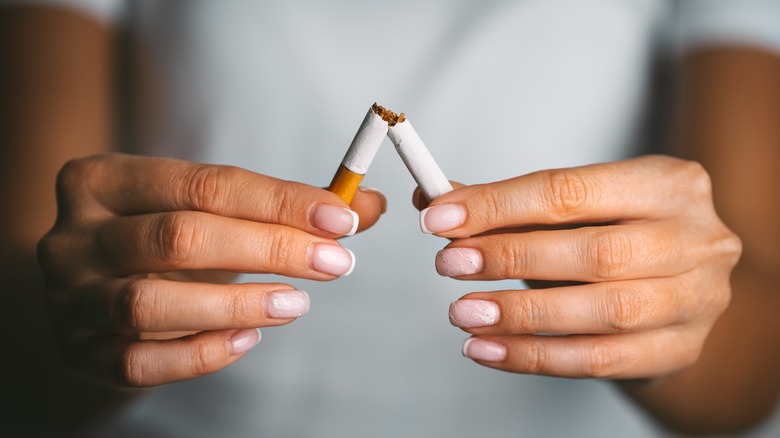
Creative Cat Studio/Shutterstock
Sorry smokers, but here’s one more reason cigarettes are bad for your health: Nicotine is a stimulant and may keep you up at night (via Henry Ford Health). It can make you feel more alert and awake at night, damaging your sleeping cycle. It can also increase your chances of developing sleep issues, like sleep apnea. Unfortunately, stopping smoking can also temporarily interrupt your sleep as you experience cravings and symptoms withdrawal. But don’t worry, those feelings won’t last forever –– withdrawal symptoms seem most intense within a few days after quitting, then diminish after several weeks.
Also, you should be aware that some products intended to help you quit smoking, such as nicotine patches or prescription medications like Bupropion and Varenicline, can actually contribute to sleep problems like insomnia (via Mayo Clinic). If you’re ready to quit, or are having trouble quitting smoking, talk to your doctor so they can help you through this process.
Hot or cold temperatures
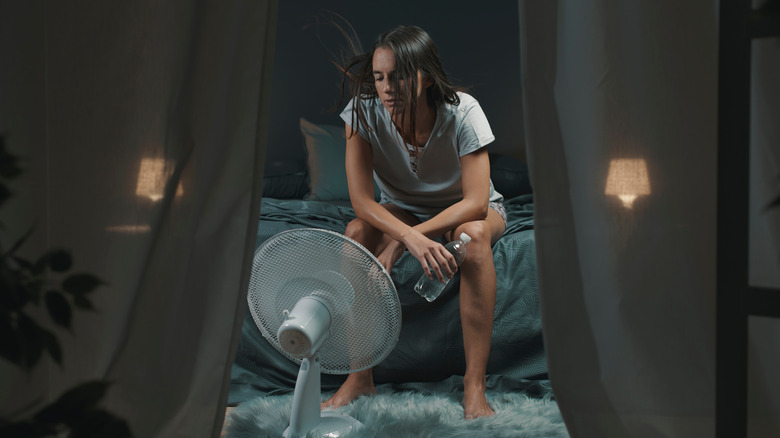
Stokkete/Shutterstock
Unfortunately, being too hot or too cold at night can ruin your sleep –– your body needs the temperature to be just right. Extreme temperatures have been found to interrupt sound sleep at night (via Healthy Sleep). However, there is no one magic number for everyone — data suggests that temperature preferences when sleeping vary depending on the individual, since everyone’s body is unique. If your body is feeling overheated, this can get in the way of your REM sleep (via Psychology Today). With a lower body temperature, you are more likely to fall asleep faster and stay asleep throughout the night. Overall, you will get good sleep if you feel comfortable at night.
Most doctors recommend aiming for a bedroom temperature between 60 to 67 degrees Fahrenheit (via Sleep Foundation). Our bodies’ core temperature slightly decreases when it’s bedtime, so a cooler room can help support this natural process and alert your body that it’s time for sleep.
Your mental health
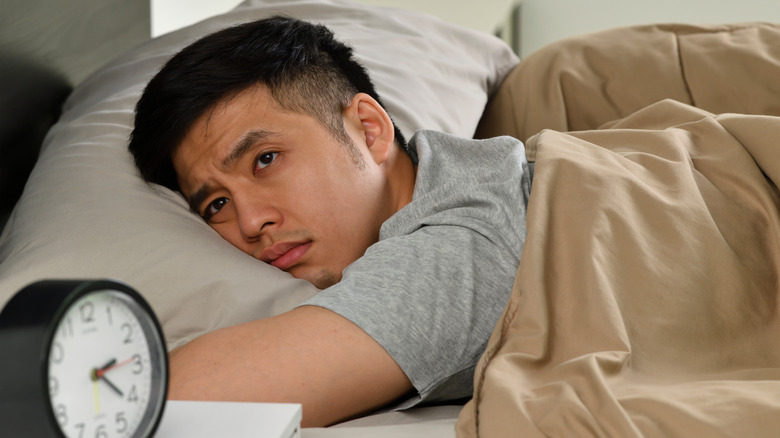
amenic181/Shutterstock
Have you ever had a hard time sleeping because you can’t stop thinking about that terrible conversation you had with your partner, or you’re worrying about a big job interview? Stress and worry from everyday life can keep us up at night (via Psychology Today). And more severe mental health struggles like depression and anxiety disrupt your sleep cycle and make it more challenging to get REM sleep.
Unfortunately, this can become a vicious cycle: Stress or mental health struggles can cause a lack of sleep, which in turn can negatively affect emotional health, which then may amplify the symptoms of depression and anxiety. Additionally, if you struggle with insomnia, you might have anxiety about going to bed because you’re already anticipating having trouble falling asleep, then all that anxiety keeps you up, resulting in a self-fulfilling prophecy (via Sleep Foundation). Breaking this pattern is not easy; if this sounds like you, speak to your doctor to figure out the best way to address your mental health and how you can get better sleep.
Your room is too bright
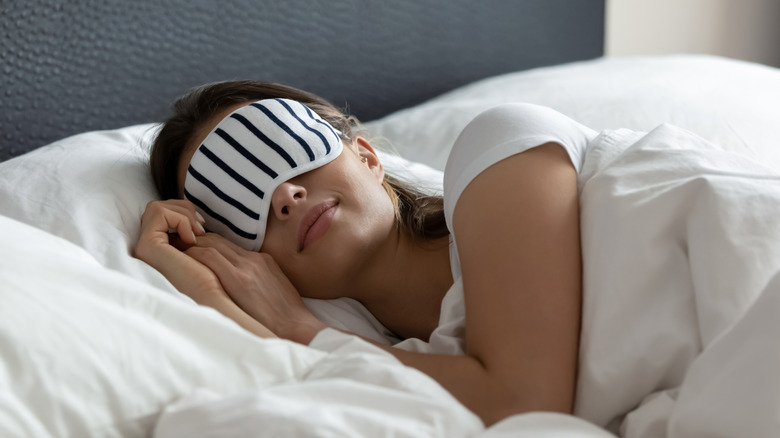
fizkes/Shutterstock
So, we know that blue light from devices with screens can affect our sleep (via Sleep Foundation). But in our modern world, we have become surrounded by this type of light — in addition to being emitted by the sun and our devices, blue light is released by fluorescent, incandescent, and LED light bulbs (via Healthline). For this reason, sleeping with any light on in the room may mess with your sleep cycle and decrease your sleep quality (via Sleep Foundation). Nighttime light exposure is linked to waking up frequently and less time soaking up the benefits of deep, restorative sleep.
Some companies have addressed this problem by selling specific lightbulbs that don’t emit blue light, or which emit less of it. If you have problems with sleep, you may want to consider switching to these type of lightbulbs in your bedroom. You may also want to think about your overall light exposure for the last couple hours before bed, and avoid spending a lot of time in a brightly lit room before you go to sleep. Ultimately, though, the Sleep Foundation recommends making your sleeping environment as dark as possible for the best sleep.
Your sleeping environment is too loud
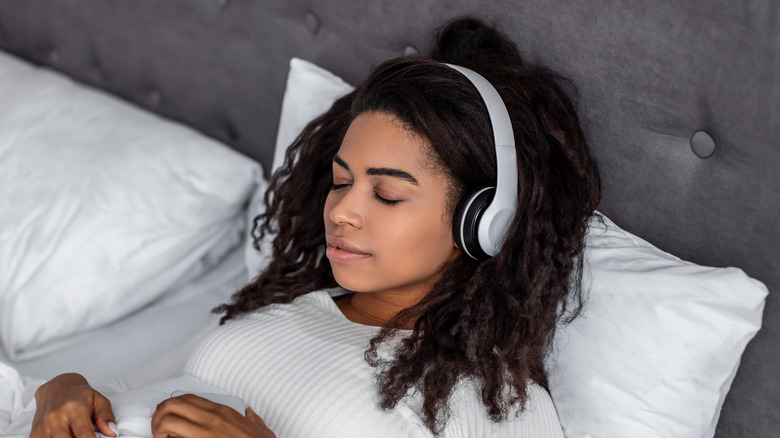
Prostock-studio/Shutterstock
Whether it’s heavy street traffic or your neighbors throwing a rager, loud noise is hard to fall asleep to (these things make earplugs essential). But if you’re a light sleeper, even gentle noises can seem loud and ruin your sleep. Your brain continues to hear noises as you sleep, so the sounds in your sleeping environment can affect your sleep cycle (via Healthline). Abrupt, sudden noises can alert your brain and wake you up, while soft noises can help support sleep.
White noise is a common source of solace for those who struggle with sleeping; the frequency of white noise can help drown out loud noises that might wake your brain and disrupt your sleep. White noise has an equal division of frequency, and so the sounds are balanced — things like a moving fan, radio static, or an air conditioner all put off white noise. However, new scientific research suggests that something called pink noise can also help support sleep (via Journal of Theoretical Biology). Pink noise contains all audible frequencies, like white noise does. But the frequency of pink noise isn’t as equally balanced as in white noise — the lower frequencies sound stronger and deeper. Examples of pink noise are often seen in nature, such as leaves rustling, the pitter-patter of rain, ocean waves, or wind (via Healthline). If you’d like to try out pink noise, many streaming services have pink noise tracks that you can play from your speakers when it’s bedtime.
Snoring
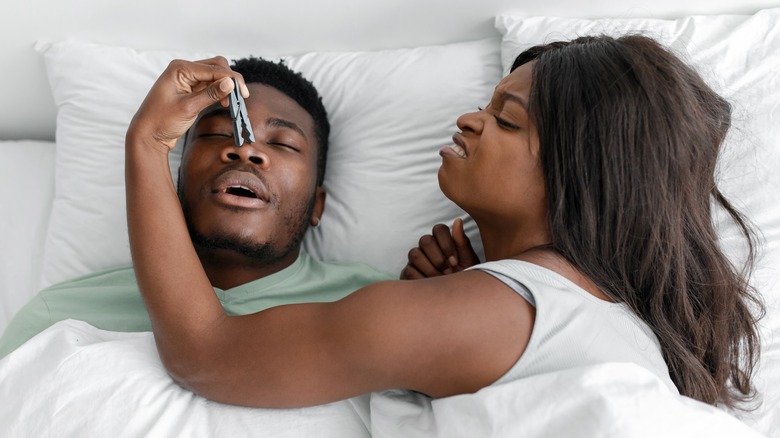
Prostock-studio/Shutterstock
If you’ve ever shared the same bed or room with someone who snores, you probably already know how much it can wreak havoc on your sleep. Earplugs and white noise can help in these situations (via Healthline). However, snoring can also affect your sleep if you are the offender. If you find that you snore more than three times a week, it could be causing sleep disruption (via Sleep Foundation). If you snore less than that, it most likely isn’t affecting your sleep.
If you snore frequently, it’s important to visit your doctor to see if you have obstructive sleep apnea (OSA), which can be a dangerous condition that causes your airways to cave in while you’re sleeping, resulting in breathing difficulties and possibly an imbalance of oxygen and carbon dioxide in your body (via Mayo Clinic). If you have OSA and it’s left untreated, it can cause sleep issues and other serious health problems. Common symptoms of OSA include loud snoring, waking up with a dry mouth or headache, insomnia, irritability, and hypersomnia. Other signs include gasping for breath and periods where you stop breathing altogether while sleeping –– you may not be able to notice these symptoms on your own and will need to be observed by someone during your sleep.
You don’t have a bedtime
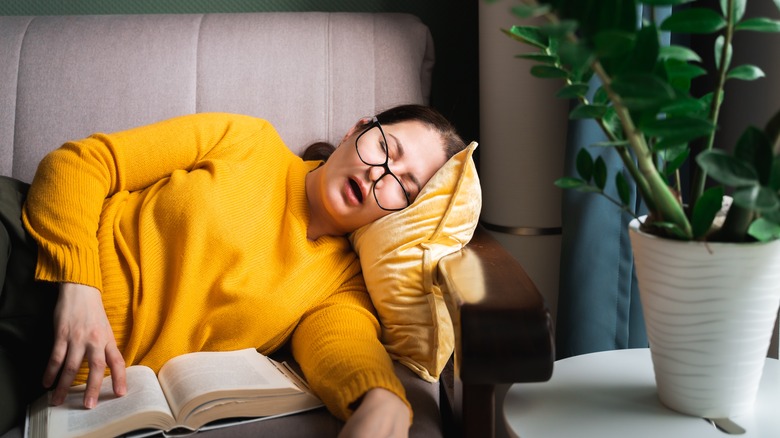
Olga Rolenko/Shutterstock
If you go to bed at a different time every night, it could be ruining your sleep. This is because our circadian rhythm likes patterns, and mixing it up every night can confuse your body so it doesn’t know when it’s meant to be tired (via Verywell Health). Worse, an erratic sleep schedule has been linked to depression — indeed, researchers found that an inconsistent sleep schedule was just as harmful to mental health as not getting enough sleep period (via NPJ Digital Medicine).
Making a consistent sleep schedule and sticking to it will help your body get into a rhythm and know when it’s time for sleep (via Verywell Mind). Be intentional about not only going to bed at the same time, but also waking up at the same time every day. If you struggle with this, try setting alarms or reminders on your phone. This routine can help improve your quality of sleep, as well as your mood.
